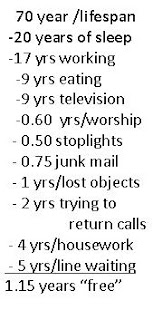This is my pastor's letter for our church's January/February newsletter.
- - - - - - - - - - - - - - - -
I like the story of a man who accidentally calls a wrong 1-800 number and gets GOD. After being apologetic about wasting God’s time with a wrong number, God says that’s OK, what we humans think is a long time is really almost nothing to him. So the man says: “Let me get this right: 1000 of our years are like nothing more than a minute to you?” And God says “yes.” “So what money?” says the man. He continues: “Is it true that you really own the cattle on a thousand hills and that everything we could possibly ever own is really yours?” Again, God responds with a “yes.”
Feeling a bit braver, he pushes on. He says, “So a million dollars to you is like nothing more than a penny, huh?” God says “That’s right.”
The man then asks “Hey God, I got a favor to ask. Can I have a penny?” To which God responds: “In a minute.”
PSALM 90:10 says: “Seventy years are given to us! Some even live to eighty.”
The most we can hope for, as far as our age goes, is about 70 years; maybe 80 or so if we’re exceptionally strong in health. And back in verse 4 of Psalm 90 we read “For you, a thousand years are as a passing day, as brief as a few night hours.”
Our full-life, in God’s reckoning of eternity, is like the morning fog: it’s gone pretty quickly without a trace. But what does 70 years give us… what value does it have?
Depends on what we put into it.
There are 24 hours in a day and 365 days in a year, which means we each have 8,760 hours in a year. If you multiply that number of hours in a year by a life span of, let’s go ahead and say 70, you get 613,200 hours in a 70 year lifespan.
BY THE WAY, by following the math out, a 70 year lifespan would have 36,792,000 minutes (36 MILLION…) OR 2,207,520,000 seconds (2 BILLION, 207 MILLION…)
So, since our time is our most precious commodity, we ALL could be considered to be MILLIONARES! (or even BILLIONAIRES). So how do we spend our time? Into what purposes and activities do we invest our time?
To start with, the average American person, in a 70 year lifespan, will have spent an average of 178,360 hours just sleeping. (7 hours/day x 7 days/ week x 52 wk/yr x 70 yr = 178,360 hours of sleep in your lifetime. To make it easier to process, you can take that number of sleeping hours (178,360) and divide it by the number of hours in a year (8760) and that means you sleep about 20 years of a 70 year lifespan.
That same person will have spent 145,600 hours of their life working, which turns out to be 17 years spent working out of 70.
That person will also spend an average of 76,440 hours of their life eating! (Assuming an hour for every meal (that’ll count your snacks) X 3 meals a day X 7 days a week X 52 weeks X 70 years = 76,440 hours of eating. That’s almost 9 years of eating!
Time spent watching television is also insightful: 3 hours of TV each day = another 9 years spent just watching T.V. !
Now, when it comes to church, there’s a bit of a problem because the AVERAGE American simply does NOT go to church! So for the average American it boils down to ZERO hours a year.
But, for OUR benefit, we’ll assume the Average American Church going Christian will have spent 6/10 of a year worshipping God.(Assuming an hour and a half each week, giving you time to get in here and get out plus the normal hour and fifteen minutes we usually set aside for the worship service.)
NOW, some reading this are going to challenge me in this. They might say: “That’s not fair, preacher! I go to church more often than that, I’m a really committed Christian!’”
Assuming that’s true, we’ll take you Sunday morning worship time PLUS EVERY Sunday School Class you’ve ever attended, PLUS EVERY Prayer Meeting scheduled, PLUS EVERY Bible Study that takes place and we can bump your weekly Church worship time up to 5 hours in a week. What’s that give us? (5 hours per week X 52 weeks X 70 years = 18,200 hours in worship in your lifetime = about 2 years spent worshipping God.
Add to those numbers the results of a Survey of 6000 people polled in 1988, reported by U.S. News and World Report:
In a lifetime the average American will spend:
Six months sitting at stoplights
Eight months opening junk mail
One year looking for misplaced objects
2 years unsuccessfully returning phone calls
4 years doing housework
5 years waiting in line
Reader’s Digest takes this even further and says that the Average American will spend 6 years looking for misplaced stuff.
OH GOD… Teach us to number our days……..
As we look back over this list of time spent, we can see how our little uses of time add up to YEARS throughout the course of a lifetime, so we need to ask God to help us number our days… to make the most of our time.
Who is our God? Our God is the one to whom we give our time and attention.
OH GOD… “teach us to number our days that we may get a heart of wisdom.”
-Psalm 90:12



